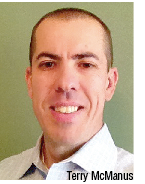By Jamie Shafer
 What does God call workplace believers to do? The same thing he tells believers in all sorts of roles and places all over the world to do—follow him. Since the moment a friend put him on the spot and asked him if he wanted to commit his life to Jesus Christ, Terry McManus,
What does God call workplace believers to do? The same thing he tells believers in all sorts of roles and places all over the world to do—follow him. Since the moment a friend put him on the spot and asked him if he wanted to commit his life to Jesus Christ, Terry McManus,
executive director for May We Help in Cincinnati, Ohio, has been striving to follow Gods’ call.
When asked what he would say to those who don’t believe they can do significant work for the Lord since they are not in vocational ministry, he quickly responds, “I struggled with that myself, but that sentiment is a lie from one who is coming to steal and destroy and take your joy. Let’s start by calling it what it is.”
Taking New Steps
McManus has had many turning- point moments in his life that have led him to his current role. May We Help is a nonprofit organization with 60 volunteers who invent or adapt existing devices to meet the needs of individuals with physical disabilities.
He spent the first 20 years of his career working for large companies in the financial industry until a sermon series at his church began to alter his thinking. He explains, “Our message series at church was focused on how God wanted to be a part of your entire life. That really hit me. I knew I needed to bring Christ into my work life. It made me nervous, but I opened myself up to what that might look like. I asked for opportunities and he gave them to me.”
 For several years God had been placing opportunities in Terry’s life that brought new perspectives on serving others and working with non-profit organizations. He served with CityLink, a group of nonprofits that came together to help the working poor in Cincinnati, and says he gained a new understanding of the cycle of poverty, as well as fundraising, and working on the frontlines. He was also able to travel with Amigos for Christ, a mission organization working in Nicaragua.
For several years God had been placing opportunities in Terry’s life that brought new perspectives on serving others and working with non-profit organizations. He served with CityLink, a group of nonprofits that came together to help the working poor in Cincinnati, and says he gained a new understanding of the cycle of poverty, as well as fundraising, and working on the frontlines. He was also able to travel with Amigos for Christ, a mission organization working in Nicaragua.
When the opportunity arose to make the career change to join May We Help, McManus was nervous at first. The support of his wife, Christine, was instrumental. “My wife really helped me take this step,” he notes. “I was coming out of 20 years in the financial industry and thinking, What if I fail? My wife put fear in its place. She said, ‘I don’t feel that way at all—you need to do this.’ After that, I never looked back.”
Providing New Hope
The work at May We Help is challenging, but rewarding. The organization found that when it comes to helping people with physical disabilities, their needs are much more individualized than most of the assistance devices that are commercially available. With help from volunteers who are artists, engineers, handymen, and more, May We Help further customizes equipment to enhance their clients’ lives.
For example, the organization’s website (www.maywehelp.org) contains the story of Danny, a 7-year-old boy confined to a wheelchair who wanted to be able to wheel into his shower without his mother’s help. His family searched but could find only adult-sized wheelchairs for shower use. A May We Help volunteer was able to design and build a custom wheelchair for Danny that gave him the freedom to be more independent.
As McManus points out, when someone with a disability, like Danny, can do something he was not able to do before, a light bulb goes off in his mind, and he begins to consider life’s possibilities on a grander scale.
He also tells the story of Elena who was born without arms, but thanks to May We Help, uses a special holder that allows her to play the cello with her feet. View videos of this and other projects at www.facebook.com/maywehelp. Volunteers are always welcome.
“This job has been a blessing to me,” McManus says. “The future we are providing is for God’s glory and we talk about that. It has also created new rhythms in my life to spend more time with God, which helps me in conversations with people. I want to tell my story to others and be vulnerable.”
Jamie Shafer is the communications director at East 91st Street Christian Church in Indianapolis, Indiana. She and her husband, Eric, have two children.



Comments: no replies